2020 so far seems like some kind of unreal gap year in our lives. As if the gods decided they will shake humanity like an Etch A Sketch and see what comes up.
The whole world must have already felt that way in the past, for example in 1939 or in 2008, when society is suddenly jolted and thrown into a new reality and we saw our life plans and goals fly out the window.
This is my way of jumping into one of the unavoidable topics for us in our little corner of the world, this year’s June 4 vigil – or, better, its cancellation.
This week, the Public Security Police Force (CPSP) refused the authorization to hold the usual annual 1989 student movement crackdown remembrance vigil at Senate Square for the first time in 30 years.
The CPSP believed the gathering would breach the local law for the prevention of contagious diseases, considering the current situation with ‘the contagious disease’ of the hour – Covid-19.
Just last week, the Municipal Affairs Bureau (IAM) had also previously withdrawn an authorisation given to the association to hold its annual photographic exhibition on the 1989 democratization movement and its crackdown, an event which is usually held at the same location as the vigil, citing the same public health reasons.
Now, this is such a sensible topic on this side of the South China Sea that the reasons for cancelling the events depend on the lens you choose to see the whole thing through.
So, let’s consider the public health reasoning for a while.
Hong Kong authorities also effectively banned an annual June 4 vigil after extending physical distancing measures limiting gatherings to a maximum of eight people.
The Health Bureau has defended that the current contagion conditions in Macau justified the decision not to hold the event.
So, if public health concerns are at stake, then local authorities should have done a less chaotic job defending their choices.
After retracting the initial authorization for the photographic exhibition, we saw the IAM President deny any political motivations and justifying his decision with the need for the IAM administrative council to “standardise” all requests by non-governmental organisations (NGOs) to use public spaces, adding that public spaces can only be used for activities related to culture, recreation, leisure, and sport, while also citing public health issues.
Afterwards, Secretary for Administration and Justice André Cheong Weng Chon also defended that the decision for the exhibition ‘re-authorisation’ was not political.
Police authorities did not cite any political motives behind the refusal for the vigil either, but the truth is that organisers were not even approached with an alternative solution for carrying out the event while implementing social distancing measures or other health precautions.
The truth is that it is hard to find any topic more political than June 4, and it would always be hard for authorities to paint the matter as solely a public health issue.
Then, there is another lens through which we can use to look at all this.
One of the most important ‘two sessions’ meeting by the Chinese government has just started, following months of a deep economic impact caused by the Covid-19 pandemic and, more importantly, after months of public protests in Hong Kong.
Tensions have been rising high between the central government and Hong Kong, and the city seems to have lost patience over the failure of the SAR Legislative Council to pass any national security legislation, deciding to take the matter in its own hands, so to speak.
During the first meeting of the 13th National People’s Congress (NPC) in Beijing, Chinese Premier Li Keqiang highlighted the necessity to establish sound legal systems to defend national security in Macau and Hong Kong.
Considering that Macau has already implemented a national security law in 2009, and that the city has been basically free of any subversive activities challenging the Chinese government authority, it’s obvious that our neighbours are the main aim of this statement, but Macau – as the ‘good student’ – is not immune from the wave of stricter security controls that are being imposed.
We live in strange and tense times, but we cannot just start writing the epitaph for ‘One Country, Two Systems’ and the benefits and development both for Mainland China and the two SARs.
Both sides must take a deep breath and decide if they want to go towards raising tensions and extremist rhetoric.
Chief executive Ho Iat Seng’s first tenure has been marred by an unprecedented international crisis, and it’s too early to say that things have changed irreparably.
The true litmus test will be next year, when – hopefully – we will live in a Covid-19-free world: free of health masks, body temperature checks, daily depressing number updates, and tumbling economic indicators.
Only then will we be able to see if 2020 was a historical blip or the new normal. For better or worse.
MNA Editor-in-Chief




















